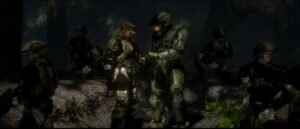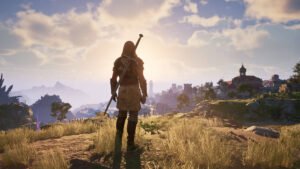Jacob Curr

It is of my belief that video games are currently the ultimate form of media which one has the potential to experience. It is the only form of media where visuals, storytelling, and music are blended into a complimentary mix and offered to the user in a way which allows them to insert themselves into the experience. Video games are just that, an experience, not purely consumption. It is the opportunity that gaming provides for one to step directly into the eyes of a different persona, an entirely new world, or in the pages of a new story that attracts so many people to the medium. And the video games that tend to provide these experiences at the highest level, usually have incredible soundtracks to prop them up.
Music is to video games as breathing is to us. Most of the time your breath goes unnoticed, inhaling and exhaling naturally without a second thought (think too hard about doing it though and it starts to get weird). Breathing is absolutely necessary to maintaining a high standard of living, and it has been placed perfectly into the background of our minds. Stop breathing, however, and you won’t be able to go a few seconds without realizing something is seriously off. Video game soundtracks are similar in that they exist in the backdrop as compliments to what the player is experiencing through the gameplay and story. A bad or mediocre soundtrack quickly becomes quite noticeable and distracting for the player. The good ones enhance the user experience by solidifying the tone and amplifying the moments that are designed to invoke an emotional response from the player. Like breathing, and not recognizing that you are alive.
The greatest video game soundtracks, though, are the ones that stand apart on their own. Those that hit just hard enough at just the right moments that they make you take a step back to bask in their glory. They that command you to pause what you are doing so that you can search them up on YouTube for an immediate relisten once you close the session. The ones that you hear for half-a-second, years later, and are brought right back into the moment that which you first heard the sound. The ones that not only compliment and enhance the game that you are experiencing, but dominate it.
These are some of my favorite soundtracks that do just that – and that you need to listen to if you have not already.
Chrono Trigger

Image Credit: Steam; Square Enix
The soundtrack of the quintessential JRPG is, as one would expect, also quintessential. I was quite late to playing Chrono Trigger, having only first experienced it via the updated Steam edition in mid 2020. Armed with with knowledge that the game was a classic but not much else, I had no clue what to expect. By the time I had finished playing, I had been left with the memories and experiences from an incredible adventure – one that is impressively reflected in its soundtrack.
Chrono Trigger’s soundtrack is a hearty one, boasting 78 tracks including the 64 original tracks produced by Yasunori Mitsuda and Nobuo Uematsu. The number of tracks may seem intimidating but many are quite short – tracks designed for specific story beats that occur as the plot progresses. The soundtrack in its entirety truly plays out like theatre or a film. One can listen to Chrono Trigger’s soundtrack and understand the big thematical moments and emotional flow of the story, even without having played the game itself, which is what I find most impressive.
The soundtrack largely utilizes keyboard and synths, as one might expect with a game like this. However woodwind and string instruments are found in tracks intending to evoke moments of tranquility, mystique, or melancholy while brass and percussion enter the ring to emphasize the story or gameplay beats that require a higher intensity (battles, conflict, or moments of inspiration). Each sound and each track are included to express a very specific idea or feeling, which tremendously enhances your immersion into the universe. It is wonderfully done.
There are so many tracks to recommend from the Chrono Trigger soundtrack, and there are so many to choose from. To make it easy for first time listeners, I recommend starting with some of the more popular tracks (they are popular for a reason). “Chrono Trigger” (title screen track), “Memories of Green”, “Wind Scene”, “Secret of the Forest”, and “Corridors of Time” are all excellent.
The Chrono Trigger soundtrack is available on:
- Spotify
- Apple Music
- Individual tracks available for free on YouTube
Halo 3: ODST

Image credit: Microsoft
Halo is legendary for its soundtracks, with the Halo theme being arguably one of the most recognized pieces of music in all of gaming. You cannot go wrong with any of the Halo games’ soundtracks, especially those produced by Bungie – they are all worth listening to. However, for me, the Halo 3: ODST soundtrack rises as a champion amongst the elite. Produced by the legendary Martin O’ Donnell and Michael Salvatori, the Halo 3: ODST soundtrack perfectly encapsulates the game’s lore and ambience. In a game where you are a lone soldier lost among a city of enemies, desperately trying to solve the mystery of your lost squad, you truly feel like you are moving among the thick of the darkness with every note played. The intensity of walking the hostile streets of New Mombasa under the cover of darkness is made incredibly palpable when backed by the game’s music tracks.
There is nothing that seems random or misplaced about this soundtrack. Every song seems calculated, every beat and cord perfectly selected to create emotion and enhance the atmosphere that the visuals and gameplay provide. To me, this is truly a masterpiece of music in gaming. If I was knowledgeable in music theory, I could likely write an entire article about the Halo 3: ODST soundtrack on its own and why it is so special. However I am not, so this will have to suffice.
This is the soundtrack that inspired this article to be written. And of the soundtrack, specifically one song: “Deference for Darkness”. If there is one track that I beg you to listen to, it is “Deference for Darkness”. If I could only listen to one singular piece of video game music for the rest of my life, it would be “Deference for Darkness”. Seriously, listen to it. You can listen to it for free on YouTube here. A glorious piano cover of the song can also be seen here by the people at AtinPiano. Other personal favorites from the soundtrack include “Asphalt and Ablution”, “Traffic Jam”, “Neon Night”, and “Skyline”.
You’ll notice upon listening that most of the tracks share common instrumentals – piano, strings, and saxophone. This differs from what those who are familiar with the mainline Halo soundtracks might be accustomed to, and helps it stand out on its own among the series. That being said, be sure to listen out for some of the more funky things that O’Donnell never seems afraid to throw into his compositions, including beefy percussion elements and mean electric guitar solos.
The Halo 3: ODST soundtrack is available to be listened to in full on:
Minecraft (The C418 Collection)

Image Credit: Microsoft; Xbox
Admittingly, this is incredibly nostalgic for me and I cannot deny the bias that 14 years of playing this game has had on this selection. As the years have passed and Minecraft has been updated, new music has been added to the game – all of which is quite good. Most of the newer stuff is so much more complex and intense than the original tracks, and they match the excitement that the new updates and their content often bring.
However, to me, nothing can beat the charmed simplicity of the original Minecraft soundtrack produced by C418 (Daniel Rosenfeld). In order to express why I love these soundtracks so much (both Volume Alpha and Volume Beta), I need to try and articulate why I love the older versions of Minecraft so much.
Older Minecraft had a different aura about it in its alpha and beta stages than it has had since its release in 2011, and much different than it has had in recent years as it has received additional updates. The tone and atmosphere of the game was so much more lonely, the dark moments more creepy. I have not thought about why this was the case enough to perfectly put my finger to it (I could probably write an entire piece about this topic), but if I had to guess I’d say it stems from the game just having so much less to do in it than the newer versions. The game felt more empty, not in a bad way at all, but in a matter of fact way. And that simplicity led the player to feeling very isolated, and the world feeling incredibly mysterious and exciting to explore. A few years ago I turned back the clock and played an alpha version of Minecraft to see if it was as good as I remembered it being as a kid, or if it had simply been nostalgia. It was not just nostalgia, it really was that good, and a lot of the reason why was indeed because of the unique atmosphere that the older versions provided.
The original soundtracks contribute immensely to that atmosphere. Largely piano/keyboard-based, the original Minecraft soundtracks reflect feelings of lonesomeness and hopefulness – like coming to a new world and overlooking an endless expanse as your mind swells with ideas and endless possibilities. The music rolls over you and overwhelms you in ways few other video game soundtracks have been able to replicate. It is incredible how quickly I feel my shoulders relax and my mind put as ease upon listening to “Clark” or “Sweden”. To this day I still consider “Mice on Venus” to be the quintessential “Minecraft” song. “Subwoofer Lullaby”, “Wet Hands”, “Aria Math”, and “Moog City 2” are other well known and well liked tracks that I highly recommend listening to, though you can’t go wrong with pretty much any song from either soundtrack album from C418.
The Minecraft soundtrack Minecraft – Volume Alpha is available on:
The Minecraft soundtrack Minecraft – Volume Beta is available on:
Check out more of my gaming articles HERE


